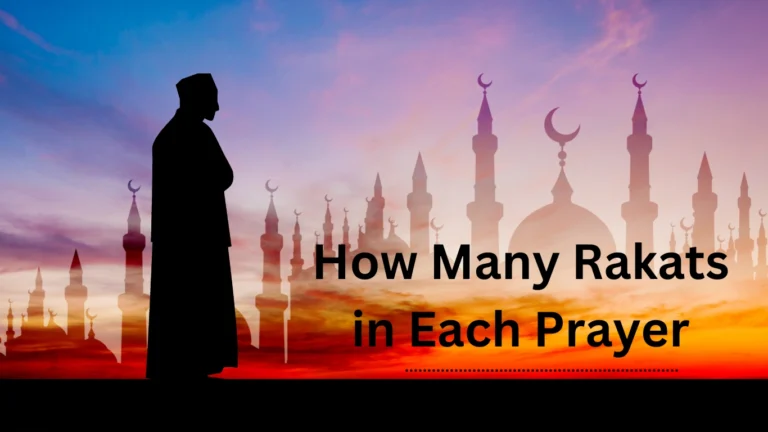Prayer is an integral part of a Muslim’s life, offering not only a moment of connection with Allah but also a structured rhythm to the day. For many young Muslims, understanding the significance and structure of each prayer can be both enlightening and motivating. This post aims to provide a detailed guide on the number of Rakats in each prayer, along with their spiritual benefits. Whether you are new to Islam or looking to deepen your understanding, this guide will help you appreciate the importance and structure of daily prayers.
How Many Rakats in Each Prayer
| Name of Prayer | Before Fard | Fard | After | Fard | ||
| Sunnah (rakahs) | Fard (rakahs) | Sunnah (rakahs) | Nafl (rakahs) | Wajib (rakahs) | Nafl (rakahs) | |
| Fajr | 2 | 2 | ||||
| Zuhr | 4 | 4 | 2 | 2 | ||
| Asr | 4 | 4 | ||||
| Maghrib | – | 3 | 2 | 2 | ||
| Isha | 4 | 4 | 2 | 2 | 3 | 2 |
| Jumuah | 4 | 2 | 4+2 | 2 |
Fajr Rakats (Morning Prayer)
Fajr is the first prayer of the day, and its timing starts from dawn to just before sunrise. It consists of four Rakats, divided into two Sunnat Mokadda and two Fard.
Sunnat Mokadda: The first two Rakats are Sunnat Mokadda, emphasizing their importance. Performing them instills discipline and commitment to start your day with the remembrance of Allah.
Fard: The remaining two Rakats are Fard, meaning they are obligatory. Missing them without a valid reason is considered a significant lapse in one’s religious duties.
Waking up early for Fajr can be challenging, but the rewards are immense. A hadith in Sahih Muslim states, “Whoever offers the Fajr prayer, Allah will protect him throughout the day.” This prayer not only saves you from hell but also brings blessings and protection from incidents throughout the day.
Zuhar Rakats (Noon Prayer)
Zuhar prayer is done after the sun has passed its highest point and starts to decline.This prayer consists of twelve Rakats, including:
Sunnat Mokadda: The first four Rakats are Sunnat Mokadda, which sets the tone for the rest of the prayer.
Fard: The next four Rakats are Fard, making them obligatory for all Muslims.
Sunnat Mokadda: After the Fard, another two Rakats of Sunnat Mokadda are performed.
Nafl: The last two Rakats are Nafl, optional but highly beneficial.
A hadith highlights the importance of Zuhar prayer by stating, “During the Zuhar Salat’s time, the gates of heaven get opened.” By performing Zuhar regularly, one can attract divine blessings and protection from the fire of hell on the Day of Judgment.
Asar Rakats (Afternoon Prayer)
The Asar prayer is performed in the late afternoon when the sun is halfway between noon and sunset. It consists of eight Rakats:
Sunnat Non-Mokadda: The first four Rakats are Sunnat Non-Mokadda, meaning they are not obligatory but offer great rewards.
Fard: The next four Rakats are Fard and must be performed.
A hadith mentions, “Whoever offers Fajr and Asar prayer will enter Jannah.” This prayer is essential for opening the doors of heaven and protecting oneself from hell. Regularly offering the Asar prayer is believed to bring health, success, and increased wealth.
Maghrib Rakats (Evening Prayer)
Maghrib prayer is performed just after sunset and must be offered before it becomes completely dark. It consists of seven Rakats:
Fard: The first three Rakats are Fard and must be performed.
Sunnat Mokadda: The remaining two Rakats are Sunnat Mokadda.
Nafl: The last two Rakats are Nafl and optional but beneficial.
A hadith in Sahih Bukhari warns, “He who missed Maghrib prayer will be punished in this world and hereafter.” Performing Maghrib prayer attracts countless blessings, while skipping it leads to severe consequences.
Isha Rakats (Night Prayer)
Isha is the last prayer of the day, performed after it gets dark and before the Fajr prayer. It consists of seventeen Rakats:
Sunnat Mokadda: The first four Rakats are Sunnat Mokadda.
Fard: The next four Rakats are Fard.
Sunnat Mokadda: Another two Rakats of Sunnat Mokadda follow.
Nafl: Two Rakats of Nafl, which are optional.
Witr: Three Rakats performed as Wajib-ul-witar.
Nafl: The final two Rakats are Nafl.
Isha prayer is crucial for a peaceful night and divine protection until the morning. Performing this prayer ensures that angels guard you through the night.
Other Prayers
Tahajjud Prayer
Tahajjud is an optional prayer performed at midnight, consisting of twelve Rakats of Nawafil. It offers an opportunity for a deeper connection with Allah during the quietest part of the night.
Tarawih Prayer
Tarawih is specific to the holy month of Ramadan, consisting of twenty Rakats of Sunnat Tarawih. It is a time for reflection and increased devotion.
Conclusion
Understanding the structure and significance of each prayer is essential for every Muslim. Regularly performing these prayers not only strengthens your faith but also brings numerous spiritual and worldly benefits. If you’re looking to deepen your understanding or need personalized guidance, consider booking a session with a knowledgeable teacher who can help you refine your practice and enhance your spiritual journey.

